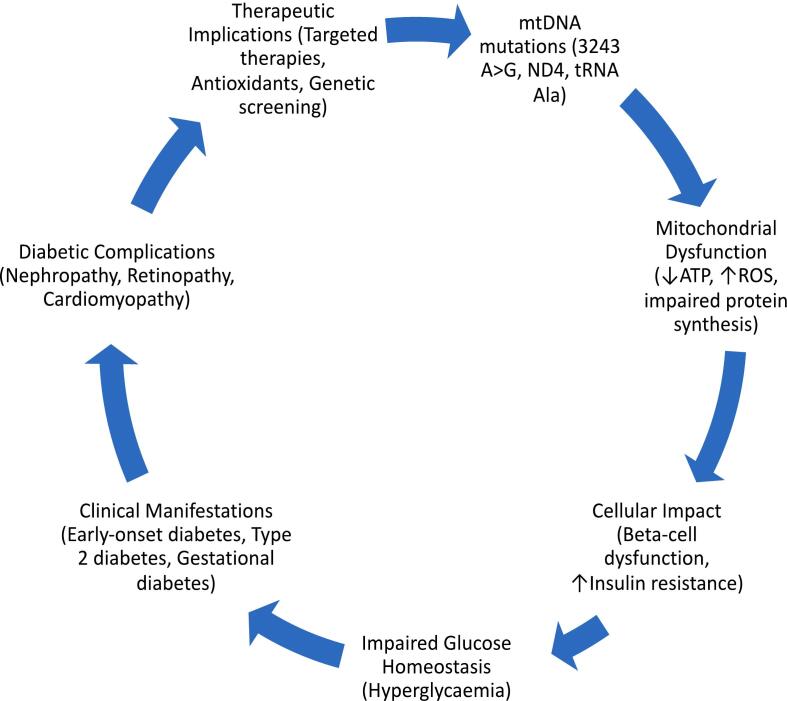线粒体DNA变异在糖尿病发病机制和代谢改变中的作用。
IF 1.9
4区 医学
Q3 GENETICS & HEREDITY
引用次数: 0
摘要
线粒体DNA (mtDNA)变异通过扰乱线粒体功能、能量代谢、氧化应激反应甚至胰岛素分泌而显著影响糖尿病。的m.3243>g变异与母系遗传性糖尿病和耳聋(MIDD)有关,其中早发性糖尿病和听力损失是显著特征。其他类型的mtDNA变异包括ND4基因和tRNA Ala基因,它们增加了2型糖尿病的易感性。了解这些变异将为开发靶向治疗以改善线粒体功能和代谢健康提供基础。这篇文章回顾了mtDNA变异对糖尿病的影响,特别是关于m.3243>g变异影响线粒体功能和胰岛素分泌以及其他mtDNA变异,这些变异有助于糖尿病易感性,特别是ND4和tRNA Ala基因变异。从现有文献的数据进行综合,以获得mtDNA变异如何影响糖尿病发病机制的理解。MIDD的主要缺陷是m.3243>g变异,包括对代谢综合征和2型糖尿病的易感性增强,随后是线粒体功能障碍、胰岛素抵抗和β细胞功能障碍。其他mtDNA变异也被报道通过线粒体功能障碍和胰岛素抵抗增加糖尿病易感性。线粒体功能障碍导致活性氧(ROS)产生增加,增加了代谢和组织损伤。这种情况发生在对葡萄糖稳态至关重要的组织中,它代表了线粒体功能障碍对糖尿病代谢紊乱的重要贡献。这些机制将奠定开发靶向治疗的基本原理,以保持线粒体功能,从而改善糖尿病患者的代谢健康。本文章由计算机程序翻译,如有差异,请以英文原文为准。

Mitochondrial DNA variants in the pathogenesis and metabolic alterations of diabetes mellitus
Mitochondrial DNA (mtDNA) variants considerably affect diabetes mellitus by disturbing mitochondrial function, energy metabolism, oxidative stress response, and even insulin secretion. The m.3243 A > G variants is associated with maternally inherited diabetes and deafness (MIDD), where early onset diabetes and hearing loss are prominent features. Other types of mtDNA variants involve genes ND4 and tRNA Ala genes that increase susceptibility to type 2 diabetes. Understanding these variants will provide a basis for developing targeted therapy to improve mitochondrial function and metabolic health. This article reviews the impact of mtDNA variants in diabetes, specifically with regards to the m.3243 A > G variant effects on mitochondrial function and insulin secretion and other mtDNA variants that contribute to diabetes susceptibility, particularly ND4 and tRNA Ala gene variants. Data from extant literature were synthesised to obtain an understanding of how mtDNA variants affect diabetes pathogenesis. The main defect for MIDD is the m.3243 A > G variant, which comprises enhanced susceptibility to metabolic syndrome and type 2 diabetes, followed by mitochondrial dysfunction, insulin resistance, and beta-cell dysfunction. Other mtDNA variants have also been reported to enhance diabetes susceptibility through mitochondrial dysfunction and insulin resistance. Increased production of reactive oxygen species (ROS) resulting from mitochondrial malfunction adds to metabolic and tissue damage. This happens in tissues crucial to glucose homeostasis, and it represents an important contribution of mitochondrial dysfunction to metabolic disturbances in diabetes. These mechanisms would underlie the rationale for developing targeted therapies to preserve mitochondrial function and, hence improve the metabolic health of diabetic patients.
求助全文
通过发布文献求助,成功后即可免费获取论文全文。
去求助
来源期刊

Molecular Genetics and Metabolism Reports
Biochemistry, Genetics and Molecular Biology-Endocrinology
CiteScore
4.00
自引率
5.30%
发文量
105
审稿时长
33 days
期刊介绍:
Molecular Genetics and Metabolism Reports is an open access journal that publishes molecular and metabolic reports describing investigations that use the tools of biochemistry and molecular biology for studies of normal and diseased states. In addition to original research articles, sequence reports, brief communication reports and letters to the editor are considered.
 求助内容:
求助内容: 应助结果提醒方式:
应助结果提醒方式:


